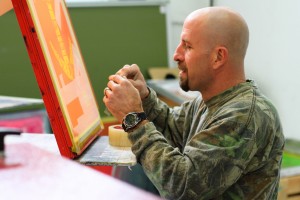
Lead printer William Williams prepares a screen to print custom T-shirts. (Photo by Chris Cole.)
Students at Vanderbilt University in Nashville, Tenn., have created a business to help give job skills and experience to the ex-offenders they share a home with.
Their home, Dismas House, a unique halfway house which may be the only one of its type in the nation, was created nearly four decades ago by a former university chaplain to bring students and ex-offenders together. He believed that both groups have much in common as they begin to embark on new lives.
While Dismas House has been around for a while, its business was created more recently. In fact, it was just a few years ago that Kyle McCollom was returning to his dorm after sharing an evening meal with the residents – a meal where the discussion centered on how difficult it is for ex-offenders to find employment. As he walked past a student wearing a custom T-shirt, he had the sudden inspiration to create a T-shirt company that would employ Dimas House residents. Others were enthusiastic about the idea.
“At the time I wasn’t living at Dismas House, but I decided to move there to learn from the guys how a workforce development enterprise could help them,” McCollom says. “I don’t know their world. I don’t know what they go through every day. Ex-offenders often have trust issues, because they’ve been promised so many things. I needed to gain their trust, and one of the ways I could do that was to move into the house.” He ended up living there for eight months, and during that time worked on preparations for the Triple Thread T-shirt company.
Like most new ventures, it wasn’t easy. And like many new ventures one of the greatest challenges was raising enough capital. The students did that by a two-month Kickstarter campaign, which brought in $11,000, a grant from the Corrections Corporation of America and another grant from the Clinton Global Initiative, which gave them the money they needed to buy their first equipment.
Triple Thread was officially launched on Sept. 10, 2010, when 300 people came to celebrate the new business and its initial employees. Since then, more than 30 Dismas House residents have been trained to work in the business. Ex-offenders stay for a period of three to six months at Dismas House, and during that time, some of them work part time at Triple Thread with the understanding that they’re spending the rest of their day looking for employment that will sustain them once their Dismas House residence is over.
While employment at Triple Thread is usually finished when the ex-offenders leave Dismas House, the company’s first employee, William Williams, is still around as the lead printer and a partner in the endeavor.
Although the original marketing plan for the company’s T-shirt sales targeted colleges across the nation, efforts have since been switched to Nashville and the city’s nonprofit organizations, schools and businesses. Mail orders, however, are coming in from places like Austin and St. Louis, and a new online design program will allow customers to create designs electronically.
The response of the Nashville community has been incredible, according to McCollom. “The concept of using a sustainable source of revenue to solve a social problem is very appealing,” he says. “It makes Dismas House as a nonprofit a more enticing opportunity for foundations. We’re saying invest in our nonprofit, and we will have returns year after year, and by increasing revenue we’re increasing opportunities for employment. We’re very thankful for the help that the Nashville community has given us as investors, customers and supporters.”
Perhaps other organizations working with ex-offenders may want to explore the idea of setting up a screen-printing business. The PanZou Project in North Miami, Fla., runs one to help rehabilitate gang members and ex-offenders, and there may be others doing the same.
If you’re considering creating a custom T-shirt business to provide employment for ex-offenders in your local area, check out the American Screen Printing Association. This association is actually a for-profit business, but it offers a series of free how-to articles and videos on its website covering a wide variety of topics ranging from how to set prices to technical issues encountered while printing. Once you establish a business you can join the organization for free and be listed in its online directory.
Those really serious about launching a business of this type, however, can save themselves time and headaches by hiring someone with a background in the screen-printing industry. Kyle says he wasted a lot of time trying to teach himself the business by watching YouTube videos, but nothing beats a general manager who knows what they are doing.
For more information on Triple Thread, check out https://www.triple-thread.com/. To learn about the PanZOu Project, go to https://www.facebook.com/PanZOuProject/, and to find information on the American Screen Printing Association, visit www.screenprinting-aspa.com.

